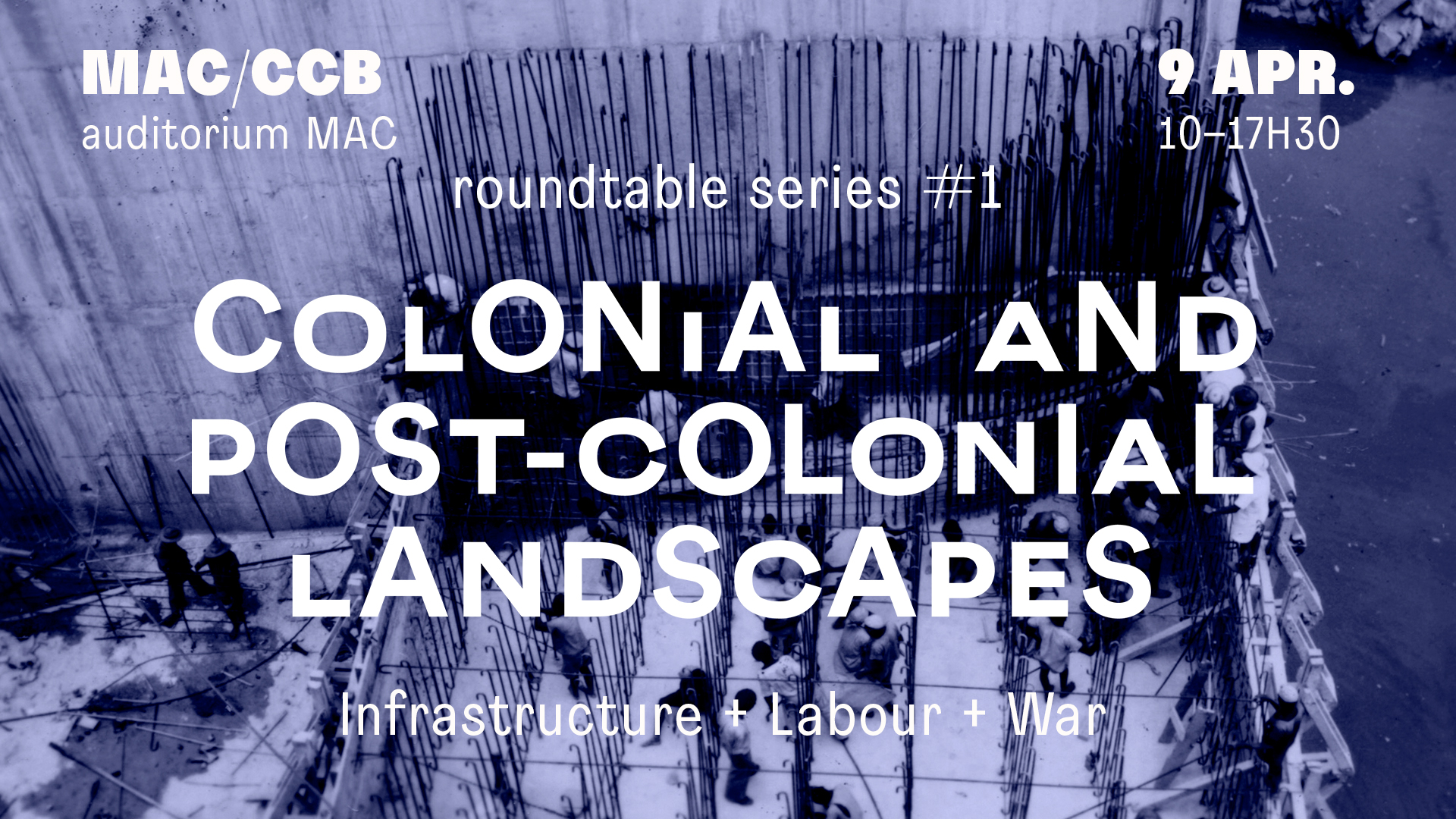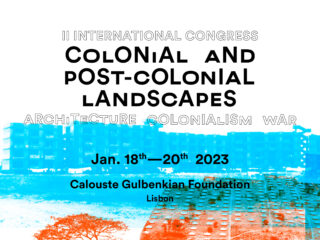Abstract
Colonial and Post-Colonial Landscapes: roundtable series I.
Infrastructures + Labour + War
9 APRIL, 2024
CCB- auditorium MAC (Lisbon)
Since 2019, the Colonial and Post-Colonial Landscapes International Congresses (CPCL) have been critical forums in enquiring about the entanglements between Architecture and Portuguese colonialism. While built works have often been the focus of Architectural history, multiple agents and agendas remain to be grasped. This first Roundtable on Infrastructures + Labour + War aims to question the role of still overlooked actors and agencies on different occupation strategies during late Portuguese colonialism. The debate will bring together the teams from the research projects ArchWar, funded by the Portuguese Foundation for Science and Technology (FCT), and ArchLabour, funded by the European Research Council (ERC), both based at Dinâmia’CET Iscte, along with invited consultants and scholars.
The morning session will feature the launch of the special issue “Colonial and Post-Colonial Landscapes: Architecture, Cities and Infrastructures” (no. 39) of the journal Africana Studia (ed. CEAUP). The volume brings together a set of articles selected from the first edition of the CPCL Congresses, held in Calouste Gulbenkian Foundation, Lisbon. The session will be moderated by Ana Silva Fernandes (University of Porto), editor of this issue and Karina Ramos (CEAUP) member of the Journal editorial team and it will be participated by the authors, either in person or remotely.
In the afternoon, Cristiana Bastos (University of Lisbon), Peter Scriver (University of Adelaide), and Johan Lagae (University of Ghent) will share their perspectives on unskilled labour, building yards and colonial public works, crossing different inter-imperial experiences and setting forward new avenues for research. Ana Vaz Milheiro (Iscte-IUL), the Principal Investigator of ArchWar and ArchLabour projects, will chair the debate.
Programme
10 – 10H45 | WELCOME
Paulo Tormenta Pinto (Dinâmia’CET-Iscte)
Ana Vaz Milheiro (Dinâmia’CET-Iscte)
11 – 12H00 | Journal launch Africana Studia #39
ed. Ana Silva Fernandes (FAUP), Karina Ramos (CEAUP)
14 – 15H00
“Managing an ERC Advanced Grant and team: notes from the project The Colour of Labour – The racialized lives of migrants”
Cristiana Bastos (Institute of Social Sciences -UL)
15 – 16H00
“Learning from Labour as Method: From colonial public works to ‘South-South' cooperation”
Peter Scriver (University of Adelaide)
16 – 17H00
Who builds your ‘Concrete Monsters’? Notes on investigating Labor, Material Ecologies and the ‘Geopolitics of Concrete’ in Mobutu’s Zaïre
Johan Lagae (Department of Architecture and Urban Planning, Ghent University)
17 – 17H30 | Roundtable
mod. Ana Vaz Milheiro (Dinâmia’CET-Iscte)
Kick-start showcase
“The Mabubas Dam’s site construction and workforce (1948-1954)”
Keynote Speakers
Cristiana Bastos (Institute of Social Sciences-UL)
“Managing an ERC advanced grant and team: notes from the project The Colour of Labour – the racialized lives of migrants”
The Colour of Labour
In the project The Colour of Labour: the Racialized Lives of Migrants we examine the ways in which the positions in the production structure generate racialized identifications which are at once contingent, hierarchical and naturalized. Social categories thus produced may appear as ethnicities, nationalities, cultures, races, or other collective entities; their dynamics combine the needs of a production system based on inequalities and hierarchies, on the one hand, and, on the other, the ideological representations that vary from explicit racism to a goal of equalitarian multiculturalism.
Rather than addressing the quintessential sites of race-production like the colonial plantations of the Americas and Caribbean based on enslaved African workforce, we explore the processes of racialization in other plantation and plantation-like economies based on imported, indentured, contracted, contingent and mobile migrant work across political boundaries.
As a large, multidisciplinary team, we combine the analytical and methodological traditions of anthropology, history, history of science and technology, sociology, social geography, migration and mobility studies in order to explore the political, ideological, scientific, technological, cultural and the experiential dimensions of the racialization processes.
Biography
Cristiana Bastos is an anthropologist and a research professor at the Institute of Social Sciences, ULisboa. She works at the convergence of anthropology and history, with main interests in population studies, public health, epidemics, the production and circulation of medical knowledge, racialization and, in recent years, plantation societies and human-plant relations. She has researched in Brazil, the United States, Goa, Guyana, Hawaii and southern Portugal.
Peter Scriver (University of Adelaide)
“Learning from Labour as Method: From colonial public works to ‘South-South'
cooperation”
The symbolic forms and spatial order produced by the architectures of colonialism were among the more obvious tools with which colonial administrations attempted to ‘divide and rule’ their subject populations. In the case of British colonial India, however, the division of labour imposed within the Public Works Department (PWD) system had a comparably profound impact on not only the architectural designs it produced, but the selection, skilling and classification of the technical and manual labour with which such public works and buildings were constructed. Arguably, despite the racially discriminatory policies and practices through which this ‘subaltern’ work force was recruited into colonial service, the social and institutional legacies of the PWD ‘system’ in Independent India’s building world would outlast many of the original colonial public works themselves. Indeed, in a wider and expanding world of ex-colonial new states the latent coloniality of such public works labour systems could even open-up unanticipated opportunities for transnational exchange.
Moving from questions of labour in the speaker’s previous work on colonial India, the talk will proceed to discuss on-going research on ‘South-South’ cooperation and exchanges of labour, material, and know-how across the post-colonial building worlds of the emerging Global South in the latter half of the 20th century, not least between India and Africa. The talk will also reflect on previously untapped archival sources and the novel tactics with which a new generation of emerging researchers are enhancing our understanding of who actually built the architecture and infrastructure of the colonial world, and how.
Biography
Professor Peter Scriver is a critical authority on the architecture and planning histories of colonial and contemporary South Asia, Peter Scriver’s theoretical work on culture and cognition in the design and reproduction of colonial built environments has been path-breaking. His extensive research on the built and cognitive legacies of the British Indian Department of Public Works has explored the instrumental role of such institutionalized agency in the propagation of architecturally embedded knowledge of social space and order across and beyond the colonial arena. Peter Scriver is a founding director of the Centre for Asian and Middle-Eastern Architecture (CAMEA) at the University of Adelaide, Australia, where his ongoing work focuses on the colonial-modern foundations of contemporary built environments, and the broader frameworks of their production, with a specific focus on the transregional building world of the Indian Ocean Rim.
Johan Lagae (Department of Architecture and Urban Planning, Ghent University)
Who builds your ‘Concrete Monsters’? Notes on investigating Labor, Material Ecologies
and the ‘Geopolitics of Concrete’ in Mobutu’s Zaïre
Architecture was a key instrument in Mobutu’s nation building-project which he launched in the second half of the 1960s under the label recours à l’authenticité and which included a new toponomy for the nation, Congo being renamed Zaïre. It resulted in the construction of a number of large-scale public buildings, which complemented the unfinished skyline of Kinshasa, the city which during colonial times was cityscape of Kinshasa, I will present a narrative that seeks to contribute to writing a more global history of the ‘Geopolitics of Concrete’ (Adrian Forty). Drawing on archival findings in both Kinshasa and Belgium, I will discuss the architectural and engineering labour involved in erecting such spectacular complexes as the Ministry of Foreign Affairs (1968-1974), or the Monument to the heroes of the nation (1970-1974), projects which fit the category ‘Concrete Monsters’ popularized by the 2017 project SOS Brutalism. A Global Survey. Archival sources remain conspicuously silent on the modes of production of these buildings, posing particular challenges for anyone interested to write a comprehensive history of who actually built these ‘concrete monsters’.
Biography
Johan Lagae, Senior Full Professor at Ghent University, teaches 20th-century Architectural History with a global focus. He holds a Ph.D. in colonial architecture in the Democratic Republic of Congo (DRC) and has published widely on the topic, as well as on 20th-century architectural and urban history in Central Africa, including the notion of colonial built heritage and photography in (post)colonial Africa. He has coauthored two books on the architecture and urban landscapes of Kinshasa and most recently coedited, together with architect Nina Berre and anthropologist Paul Wenzel Geissler, the volume African Modernism and its Afterlives (2022). He currently acts as coeditor-in-chief of ABE Journal. Johan Lagae has cocurated several Congo-related exhibitions and has collaborated with several artists from the DRC, among others including Patrick Mudekereza and Sammy Baloji (most recently for the latter’s Aequare: The Future That Never Was project at the Venice Architecture Biennale 2023). Johan Lagae has been the recipient of various grants, has held a Francqui Chair at the Université Libre de Bruxelles in 2020, and was a 2019-2020 fellow at the Institute for Advanced Studies in Paris.

